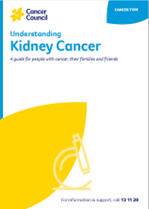- Home
- Kidney cancer
- Diagnosis
- Tests
- Tissue biopsy
Tissue biopsy
A biopsy is when doctors remove a sample of cells or tissue from an area of the body. It is a common way to diagnose cancer, but it is not always needed for kidney cancer before treatment. For many people with kidney cancer, the main treatment is surgery. In this case, the tissue removed during surgery is tested to confirm that it is cancer.
A biopsy may be done before treatment when:
- it is uncertain if the tumour is cancerous or benign
- alternative treatments (such as ablative therapy, active surveillance or radiation therapy) are recommended – a biopsy will help work out what other treatment is needed
- it appears that the cancer has spread beyond the kidney and a biopsy will be helpful to guide systemic drug therapy.
If a biopsy is done, it will be a core needle biopsy. You will have a local anaesthetic to numb the area, and then an interventional radiologist will put a hollow needle through the skin. They will use an ultrasound or CT scan to guide the needle to the kidney and remove a sample of tissue. The procedure usually takes about 30 minutes but you may need to rest for a few hours before you can go home. You may also have some discomfort or notice some blood in your urine.
The tissue sample will be sent to a laboratory, and a specialist doctor called a pathologist will look at the sample under a microscope to check for any cell changes.
In some cases, a kidney tumour will turn out to be benign (not cancer). Small benign kidney growths, including oncocytoma and angiomyolipoma, may not need treatment. If they do, it may be similar to the treatment for early kidney cancer.
→ READ MORE: Staging and prognosis for kidney cancer
Podcast: Tests and Cancer
Listen to more episodes of our podcast for people affected by cancer
More resources
Dr Alarick Picardo, Urologist, Fiona Stanley Hospital, WA; Heidi Castleden, Consumer; Donna Clifford, Urology Nurse Practitioner, Royal Adelaide Hospital, SA; Mike Kingsley, Consumer; Prof Paul De Souza, Medical Oncologist and Professor of Medicine, Nepean Cancer Care Centre, The University of Sydney, NSW; Prof Declan Murphy, Urologist and Director of Genitourinary Oncology, Peter MacCallum Cancer Centre, VIC; Caitriona Nienaber, 13 11 20 Consultant, Cancer Council WA; Luke O’Connor, Urology Nurse, Royal Brisbane and Women’s Hospital, QLD; A/Prof Shankar Siva, Radiation Oncologist and Cancer Council Victoria Colebatch Fellow, Peter MacCallum Cancer Centre, VIC; A/Prof Homi Zargar, Uro-Oncologist and Robotic Surgeon, Western Health and Royal Melbourne Hospital, VIC.
View the Cancer Council NSW editorial policy.
View all publications or call 13 11 20 for free printed copies.
Need to talk?
Support services
Cancer Connect
Talk to someone who has experienced cancer
Looking for transport, accommodation or home help?
Practical advice and support during and after treatment
Cancer information
Dealing with the diagnosis
Common reactions to a cancer diagnosis and how to find hope
Patient rights and responsibilities
What you can reasonably expect from your health care providers

